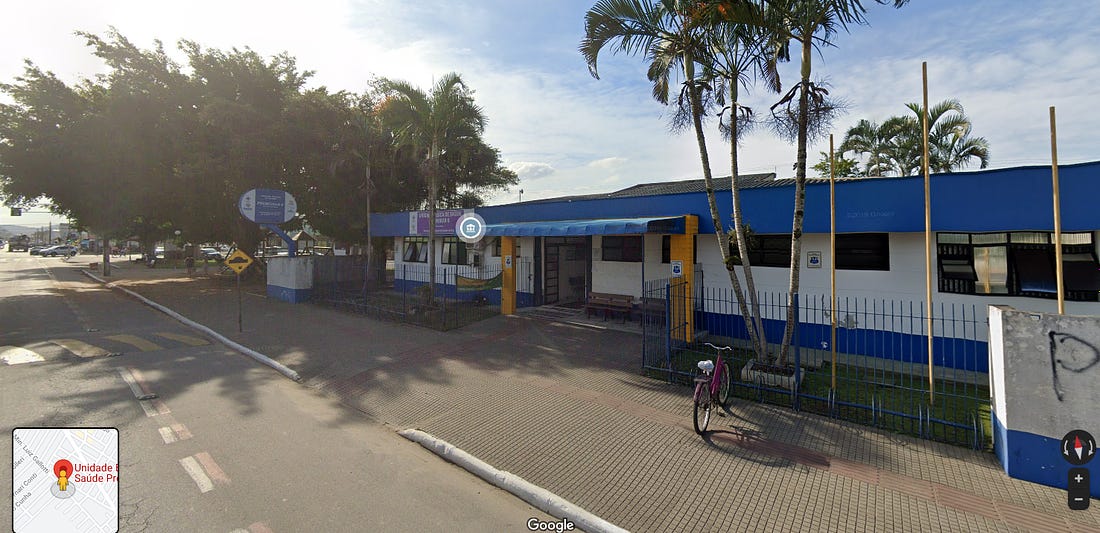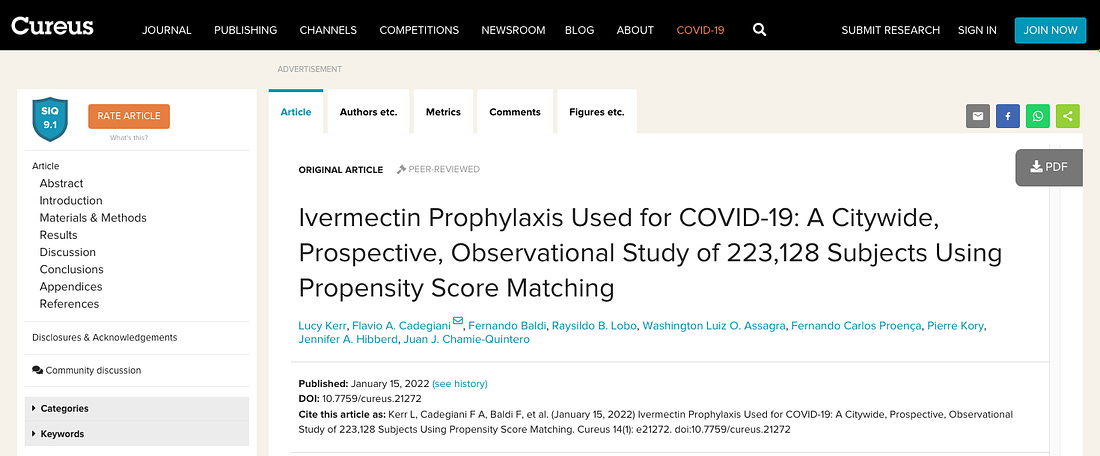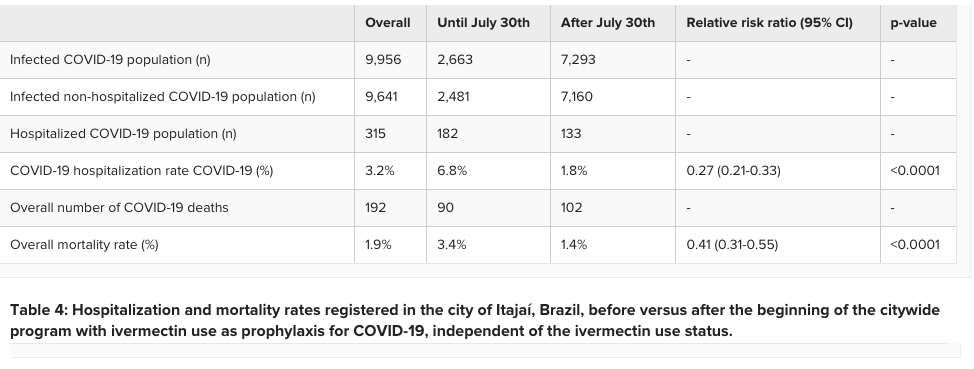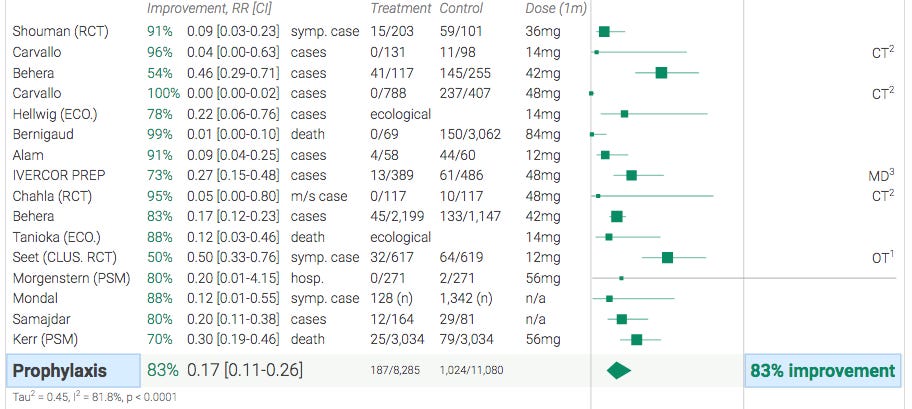
Over the weekend, after reviewing the data by three independent groups of scientists, the 68% efficacy of the preventive ivermectin against deaths caused by COVID-19 was confirmed. The final results of the study were published in the prestigious scientific journal Cureus, based in San Francisco, USA, and with a chapter in Munich, Germany.
Cureus has two esteemed editors-in-chief in the scientific community: Dr John Adler Jr, Professor of Neurosurgery and Radiation Oncology (Emeritus) at Stanford University in California, and Dr Alexander Muacevic, the medical director of the European Radiosurgery Center in Munich, Germany and a professor at the University of Munich Hospitals.
The largest ivermectin study in the world only occurred because of the excellence of SUS

The study was only possible due to the excellence of the Brazilian public health system. “The National Health System (SUS) functions as full healthcare support to the entire population allowed the city to establish a non-restricted population program,” the scientists explained in the study.
Only people over the age of 18 participated. “Children were excluded. And also people who have had COVID before,” Lucy Kerr explained.
Thus, of the 223,128 citizens of Itajaí considered for the study, a total of 159,561 individuals were included in the analysis: 113,845 (71.3%) ivermectin users and 45,716 (28.7%) non-users.
The drug was offered by the municipal government to all citizens and only those residents who wanted it participated. “Patient preferences and medical autonomy were preserved,” the scientists explained.
SUS professionals in Itajaí monitored and recorded the data of both patients who took ivermectin and those who did not take the drugs. “The whole city had digital registration at SUS and it was being updated with the new consultations as people went to get their medication,” Kerr said.
The scientist praises the health professionals in Itajai. “They all collaborated very, very much,” said Dr. Lucy. “It wasn’t just data if they took it or didn’t take it. It was also knowledge of all people’s previous comorbidities and illnesses. Whether they had asthma, diabetes, cancer.”
“I don’t know if this would be possible in other countries, since Brazil, through SUS, is one of the most digitalized countries, and with accurate data, in the health system,” said Dr Flavio Cadegiani, one of the scientists involved in the data analysis.
Result: 44% reduction in chance of getting COVID-19, study concludes

Among all citizens over the age of 18 with no history of COVID, 113,845 volunteered to take Ivermectin every two weeks. Among those who did not volunteer, there were 45,716 people.
Over the next six months, among those taking ivermectin, 3.7% became infected with the virus. Among non-users, 6.6%. There was a 44% reduction, therefore, in the chance of being infected with Sars-Cov-2, the virus that causes COVID-19.
Once infected, 56% reduction in chance of being hospitalized
Among the 113,845 who took ivermectin, 4,197 had Covid. Among the 45,716 who did not take it, 3,034 had Covid.
In the study, from this point on, there was an advanced statistical technique called Propensity Score Matching, where two groups were balanced to be similar with regard to age and risk factors, such as previous diseases and sex. Thus 3,034 citizens using ivermectin were matched and compared with 3,034 non-users.
The hospitalization rate among users of the preventive medicine was 1.6%. Among non-users, it was 3.3%. Therefore, ivermectin reduced the need for hospitalizations by 56%.
A 68% reduction in mortality among ivermectin users
Among the 3,034 with COVID not users of preventive ivermectin, 79 people (2.6%), died. Among the 3,034 in the comparison group, ivermectin users, 25 people (0.8%) died. So there was a 68% reduction in mortality.
“There was no early treatment established by the municipality, so there was no interference in the study regarding hospitalization and death. It’s just the effect of prophylaxis. With treatment after infection, the numbers tend to improve,” says Dr Flavio Cadegiani.
“The statistical technique used, the PSM, allows us to affirm that the study has the power close to a randomized clinical trial,” he added.
How peer review happened
Peer review, when other scientists review and attest to the scientific quality of articles, is an essential scientific process. In the case of this study, three independent groups had access to all the data and the manuscript. Subsequently, they contacted the authors anonymously via the Cureus journal communication system. Each group of reviewers was classified with a letter of the Greek alphabet: Alpha, Beta, and Gamma.
“In addition to peer review, the study goes through three editorial stages. And all three need to accept the work. In our case, due to the relevance of the study, we didn’t even have the opportunity to appoint reviewers. All were completely independent”, says Dr. Flavio Cadegiani.
Transparent and available data for the scientific community

“Health status was assessed and data were entered prospectively throughout the period of the program, in a fully digitized system provided by the National Health System (SUS),” the scientists stated in the study.
“Since the system existed prior to the pandemic, a significant number of the population were already registered with their health information, including past and current diseases, use of medications, and other characteristics.,” they added.
Soon, in about two weeks, with the objective of total transparency with the national and international community, the raw data extracted from the SUS system of Itajaí, containing all the characteristics of the residents, preserving their identities, will be made available. The data will be publicly available on a platform. The electronic address will be announced on the blog of the journal Cureus.
“Unlike studies with vaccines and patent medicines, this is a unique opportunity in the pandemic where scientists from around the world will be able to analyze the data. To our knowledge this is unprecedented for a study of this level and importance in Covid-19,” said Cadegiani.
This was a decision of the team that produced the study. It comes at the same time as an editorial in the BMJ (British Medical Journal), one of the world’s most respected medical journals, published yesterday, calling for all raw data on vaccines and new treatments for COVID to be made public.
Official data from the epidemiological bulletin confirm the drop in mortality throughout Itajaí
Of the more than 220 thousand inhabitants of Itajaí, only a little more than 114 thousand volunteered to use ivermectin every two weeks. Even so, the impact on the entire city was quite significant, compared to the other cities in the state.
One of the study’s results tables shows a dramatic drop in mortality before and during the study, even with much of it not using the drug. Deaths dropped from 3.5% of those infected to 1.4%.
“The most basic confirmation that there can be of this whole result is to do an analysis on all the epidemiological bulletins of the state of Santa Catarina. The difference between hospitalizations and mortality, before and during the ivermectin program, was striking. Anyone can check this at any time with official numbers,” says Cadegiani.
Doses used
ivermectin was offered in biweekly doses of 0.2mg per kg per day for two days. In other words, a person weighing between 60 and 90 kg was given 3 ivermectin tablets a day every two weeks for two consecutive days. If the weight was greater than 90 kg, 4 tablets a day for two consecutive days were offered.
“I believe the results could be even better if the use was weekly, in the same amount, while maintaining the same unquestionable level of safety,” Cadegiani explained.
Other possible uses of ivermectin
In addition to having identified no relevant side effects from the use of ivermectin citywide, the scientists wrote about promising data found: “Prophylactic use of ivermectin can be particularly impactful in older subjects. In addition, ivermectin seemed to reduce the exceeding risk of hypertension, T2D, and other diseases.,” they wrote in the study.
Dr Flavio Cadegiani, one of the authors, is excited about the possibility of other uses of the drug besides COVID-19. “Preliminary data surprised us. It helped for liver, kidney and inflammatory issues. In other words, ivermectin may help reduce fat in the liver, kidney problems, prevent inflammatory disease, and other potential metabolic benefits. It may work to control cholesterol and diabetes,” he says. “It would be a crime not to study it for those diseases,” he exclaimed.
Press attacked the action, but there was good reception among the citizens
The prophylactic action of ivermectin against COVID was proposed by Dr Volnei Morastoni, a medical doctor and mayor of the city of Itajaí. Soon after, he came under attack.
Among the various aggressions at the time, Dr Volnei was called a “witch doctor” by a local newspaper, the NCS total. In the newspaper O Estado de S. Paulo, one of the most important in the country, biologist Natália Pasternak wrote an article with the following title: “Analysis: the case of Itajaí shows how the fight against the pandemic is marked by science denialism”.
“The mayor of Itajaí seems to build public health policies based on social network fads and conspiracy theories,” she stated in the article. In her twitter, she classified the action concluded now as effective as “Itajaí madness.”
However, even at that time, the population was already suspicious of the excessive aggressiveness of the press. The positive result was felt by the population during the action, and they gave their answer in the ballot box. In October 2020, Marastoni was re-elected mayor of the city for another four-year term.
So far, four days after the international review confirming that lives were saved, there has been no apology to the mayor for the offenses. “The denialism came exactly at the person who colored himself as a defender of science. This is a great example of the catastrophe that occurs when science and political passions mix,” says Cadegiani.
“How many lives would be here today if it weren’t for the attacks devoid of logic and valid arguments?” he questions. “Vanity will never allow people to turn back. It would be to confess that they killed in the name of a false science.”
“It is important to make it clear that I did not believe in the effectiveness of ivermectin as a preventative. That doesn’t mean to say that I was against using it, because, after all, any scientist with the least humanity, knowing that there were no theurapeutic alternatives and the drug is safer than any medicine we use for headache, I would never smear or contraindicate it in a pandemic of intubated people,” Cadegiani said. “I was wrong in my bet of ineffectiveness and I assume it. That’s science.”
Journalists and science communicators got everything wrong, even the speculation that ivermectin would relax other measures
At the time, journalists and science communicators bet that the use of the drug would lead to the loosening of other measures to contain the pandemic. “The narrative that using preventive and early treatment therapies will have people relax their caution of remaining socially and physically distanced to allow more COVID-19-related infections is not supported here,” the scientists concluded in the study.
“These study data demonstrate that the use of preventive ivermectin significantly lowers the infection rate and that benefits outweigh the speculated increased risk of changes in social behaviors. Hence, we can speculate that the prophylactic use of ivermectin could play an important role in the reduction of the pandemic burden.,” they added.
Other studies on the same data from Itajaí will be coming out soon
This study aimed to evaluate the impact of the whole preventive program in the city during five months. However, many residents who started with ivermectin, discontinued after some time of use and did not complete the five months.
Now, in a phase two analysis of the data collected by the SUS, efficacy calculations are being done only on those residents who kept using the drug for the full five months. “At first, looking at the data, those who used more than 75% of the doses had zero deaths. That’s surprising. Too bad it was a minority. We are calculating the data to hand over to reviewers,” Cadegiani said.
“In the third month, of the more than 100,000 who volunteered to take ivermectin, only a little more than 8,000 continued, and even then we had this 68% reduction in deaths. Even the most optimistic were shocked.”
Daughter of a fish, a little fish is (a Brazilian saying, when sons follow their fathers)
The father of Lucy Kerr, the main scientist of the Itajaí study, was Warwick Stevam Kerr, a Brazilian scientist who died in 2018, at age 96, in the city of Ribeirão Preto, where he developed most of his brilliant career.
Warnick, with a worldwide career, besides several Brazilian universities, lectured in North American universities (Louisiana, California, Wisconsin and Columbia University in New York.). In Brazil he held important positions, such as Scientific Director of FAPESP. He was also president of the prestigious Brazilian Society for the Advancement of Science.
With relevant scientific productions, he was a member of the “National Academy of Sciences”, in the USA, besides being admitted by President Itamar Franco in the National Order of Scientific Merit in the “Grã-Cruz” class in 1994.
Lucy confesses to be inspired by her father: “I used to accompany him whenever I could. He didn’t bother to help”, she says.
There are 15 other studies on ivermectin prophylaxis. All are unanimously positive.
The Itajaí study is the largest in the world with ivermectin. Besides it, there are 15 other studies on prophylaxis, all finding positive effects of the drug against COVID-19. However, because it was with a large number of patients and uses the statistical technique PSM – Propensity Score Matching, due to the data having great precision, there is a greater weight in this study as scientific evidence. That is, Itajai only confirmed other studies.






